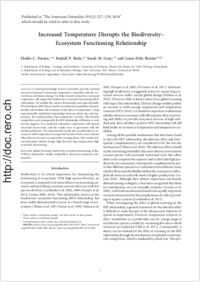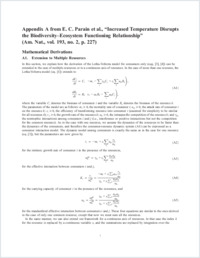Increased temperature disrupts the biodiversity–ecosystem functioning relationship
- Parain, Elodie C. Department of Biology, Ecology and Evolution Unit, University of Fribourg, Switzerland - Department of Ecology and Evolutionary Biology, Yale University, New Haven, USA
- Rohr, Rudolf P. Department of Biology, Ecology and Evolution Unit, University of Fribourg, Switzerland
- Gray, Sarah M. Department of Biology, Ecology and Evolution Unit, University of Fribourg, Switzerland
- Bersier, Louis-Félix Department of Biology, Ecology and Evolution Unit, University of Fribourg, Switzerland
-
26.12.2018
Published in:
- The American Naturalist. - 2018, vol. 193, no. 2, p. 227–239
English
Gaining knowledge of how ecosystems provide essential services to humans is of primary importance, especially with the current threat of climate change. Yet little is known about how increased temperature will impact the biodiversity–ecosystem functioning (BEF) relationship. We tackled this subject theoretically and experimentally. We developed a BEF theory based on mechanistic population dynamic models, which allows the inclusion of the effect of temperature. Using experimentally established relationships between attack rate and temperature, the model predicts that temperature increase will intensify competition, and consequently the BEF relationship will flatten or even become negative. We conducted a laboratory experiment with natural microbial microcosms, and the results were in agreement with the model predictions. The experimental results also revealed that an increase in both temperature average and variation had a more intense effect than an increase in temperature average alone. Our results indicate that under climate change, high diversity may not guarantee high ecosystem functioning.
- Faculty
- Faculté des sciences et de médecine
- Department
- Département de Biologie
- Language
-
- English
- Classification
- Biological sciences
- License
-
License undefined
- Identifiers
-
- RERO DOC 324272
- DOI 10.1086/701432
- Persistent URL
- https://folia.unifr.ch/unifr/documents/307559
Other files
Statistics
Document views: 160
File downloads:
- pdf: 417
- Supplementary material: 114

